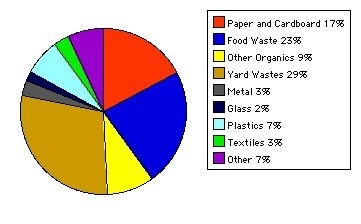Waste Management with Compost
If the question is waste management, a big part of the answer is compost. Why? Because Compost Reduces Garbage.
If you take a look at the average urban garbage stream you'll probably notice that more than half of it could just as easily be headed for a compost heap as a landfill site. The stream varies from place to place.
Here is a breakdown of the waste stream of Edmonton - a city of about a million people in Alberta Canada.

The proportions of garbage vary from place to place. For example, some communities have major compost programs. They collect compostable material at the curbside. In so doing they can reduce the overall garbage destined to the landfill by up to 65%. Pretty impressive.
While there are some excellent compost programs in some places most are limited. Here in my town of High River only yard wastes are composted at the landfill. They are picked up from a central site. Each of us needs to drive our grass, weeds and leaves to this site. Then of course we have to borrow a pick up and go to the landfill to buy the compost once it's finished.
Most places still rely on people like you and I to do the composting. And when we do the composting we have the compost handy to use in our own gardens.
While we can't handle all the compostable material ... which would include things like pet poop and meat and cheese (The meat, poop and fatty wastes need higher compost temperatures than a backyard compost pile can reliably provide so most people should leave these bits of garbage out of their compost piles.)
... we can handle a huge amount of it - all our yard wastes, our vegetable fruit and grain food wastes and our most of our non-recyclable paper (kleenex, paper towels and napkins).
You might wonder what happens to the things we could compost that end up in a landfill. Well they do decompose to some extent. Yard and vegetable wastes, after about 15 years in the landfill, decompose.
Decomposition happens quickly with the right combination of moisture, oxygen, pH, nutrients, bacteria and fungi, and temperature. In short it happens well in a managed compost pile.
In a landfill moisture content is deliberately limited to about 25% to protect groundwater. Decomposition likes about 65%.
As well conditions are anaerobic - very little oxygen is available. The microorganisms that work in this environment are slower than their aerobic cousins.
And in these anaerobic conditions the byproduct of decomposition is methane - a greenhouse gas that is 21 times more damaging than carbon dioxide.
As for the newspapers - they can still be read 25 years after being dumped at the dump.
The bottom line - backyard composting can reduce our waste by 35 - 50%. Additional composting at the municipal level could bring the total to 65-70%. That's a big decrease and with landfills in very short supply a welcome solution to the problem.
And that doesn't even consider all the good things compost does when it's used.
Compost and Soil Chemistry
Compost and Soil Biology
Special Uses for Compost


